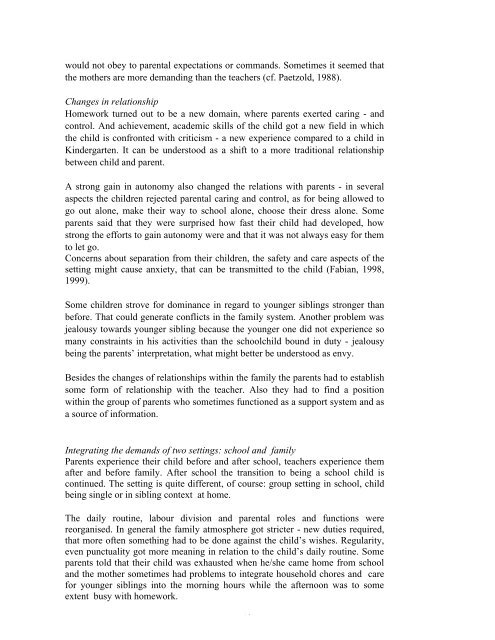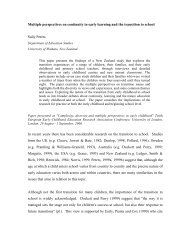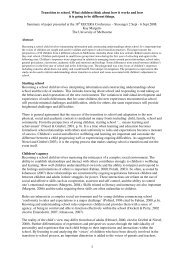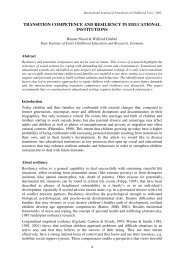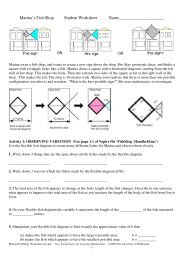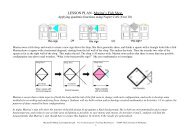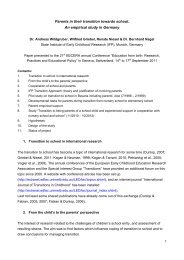From Kindergarten to school: A transition for the - Extranet
From Kindergarten to school: A transition for the - Extranet
From Kindergarten to school: A transition for the - Extranet
You also want an ePaper? Increase the reach of your titles
YUMPU automatically turns print PDFs into web optimized ePapers that Google loves.
would not obey <strong>to</strong> parental expectations or commands. Sometimes it seemed that<br />
<strong>the</strong> mo<strong>the</strong>rs are more demanding than <strong>the</strong> teachers (cf. Paetzold, 1988).<br />
Changes in relationship<br />
Homework turned out <strong>to</strong> be a new domain, where parents exerted caring - and<br />
control. And achievement, academic skills of <strong>the</strong> child got a new field in which<br />
<strong>the</strong> child is confronted with criticism - a new experience compared <strong>to</strong> a child in<br />
<strong>Kindergarten</strong>. It can be unders<strong>to</strong>od as a shift <strong>to</strong> a more traditional relationship<br />
between child and parent.<br />
A strong gain in au<strong>to</strong>nomy also changed <strong>the</strong> relations with parents - in several<br />
aspects <strong>the</strong> children rejected parental caring and control, as <strong>for</strong> being allowed <strong>to</strong><br />
go out alone, make <strong>the</strong>ir way <strong>to</strong> <strong>school</strong> alone, choose <strong>the</strong>ir dress alone. Some<br />
parents said that <strong>the</strong>y were surprised how fast <strong>the</strong>ir child had developed, how<br />
strong <strong>the</strong> ef<strong>for</strong>ts <strong>to</strong> gain au<strong>to</strong>nomy were and that it was not always easy <strong>for</strong> <strong>the</strong>m<br />
<strong>to</strong> let go.<br />
Concerns about separation from <strong>the</strong>ir children, <strong>the</strong> safety and care aspects of <strong>the</strong><br />
setting might cause anxiety, that can be transmitted <strong>to</strong> <strong>the</strong> child (Fabian, 1998,<br />
1999).<br />
Some children strove <strong>for</strong> dominance in regard <strong>to</strong> younger siblings stronger than<br />
be<strong>for</strong>e. That could generate conflicts in <strong>the</strong> family system. Ano<strong>the</strong>r problem was<br />
jealousy <strong>to</strong>wards younger sibling because <strong>the</strong> younger one did not experience so<br />
many constraints in his activities than <strong>the</strong> <strong>school</strong>child bound in duty - jealousy<br />
being <strong>the</strong> parents’ interpretation, what might better be unders<strong>to</strong>od as envy.<br />
Besides <strong>the</strong> changes of relationships within <strong>the</strong> family <strong>the</strong> parents had <strong>to</strong> establish<br />
some <strong>for</strong>m of relationship with <strong>the</strong> teacher. Also <strong>the</strong>y had <strong>to</strong> find a position<br />
within <strong>the</strong> group of parents who sometimes functioned as a support system and as<br />
a source of in<strong>for</strong>mation.<br />
Integrating <strong>the</strong> demands of two settings: <strong>school</strong> and family<br />
Parents experience <strong>the</strong>ir child be<strong>for</strong>e and after <strong>school</strong>, teachers experience <strong>the</strong>m<br />
after and be<strong>for</strong>e family. After <strong>school</strong> <strong>the</strong> <strong>transition</strong> <strong>to</strong> being a <strong>school</strong> child is<br />
continued. The setting is quite different, of course: group setting in <strong>school</strong>, child<br />
being single or in sibling context at home.<br />
The daily routine, labour division and parental roles and functions were<br />
reorganised. In general <strong>the</strong> family atmosphere got stricter - new duties required,<br />
that more often something had <strong>to</strong> be done against <strong>the</strong> child’s wishes. Regularity,<br />
even punctuality got more meaning in relation <strong>to</strong> <strong>the</strong> child’s daily routine. Some<br />
parents <strong>to</strong>ld that <strong>the</strong>ir child was exhausted when he/she came home from <strong>school</strong><br />
and <strong>the</strong> mo<strong>the</strong>r sometimes had problems <strong>to</strong> integrate household chores and care<br />
<strong>for</strong> younger siblings in<strong>to</strong> <strong>the</strong> morning hours while <strong>the</strong> afternoon was <strong>to</strong> some<br />
extent busy with homework.<br />
10


